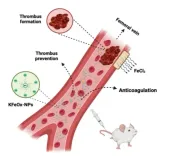Could a New AI Tool Transform Personalized Cancer Treatment?

Synopsis
Key Takeaways
- AAnet AI tool maps cellular diversity within tumors.
- Addresses tumor heterogeneity in cancer treatment.
- Identifies five distinct cell types within tumors.
- Facilitates personalized treatment strategies.
- Validated in breast cancer, promising for other conditions.
New Delhi, June 27 (NationPress) An international team of researchers has introduced a groundbreaking artificial intelligence (AI) tool that has the potential to transform cancer treatment by mapping the cellular diversity within tumors.
This innovative development addresses the challenge of tumor heterogeneity in oncology, where diverse cell populations lead to treatment resistance and recurrence, as reported by Xinhua news agency.
The AAnet AI tool, crafted by the Sydney-based Garvan Institute of Medical Research in partnership with the Yale School of Medicine in the US, employs deep learning techniques to analyze gene activity in individual cancer cells.
It identifies five distinct cell types within tumors, each exhibiting unique behaviors and varying risks of metastasis. This advanced understanding of cancer surpasses older methodologies that treated all tumor cells uniformly, according to the global research team.
"Tumor heterogeneity poses significant challenges because we currently treat tumors as if they consist of identical cells. Consequently, we administer a single therapy that may eliminate most cells by targeting a specific mechanism. However, not every cancer cell may possess that mechanism," stated Associate Professor Christine Chaffer from the Garvan Institute, who is one of the study's co-senior authors.
This leads to the survival of certain cancer cells, with the possibility of the disease reemerging, Chaffer explained. She noted that AAnet offers a means to biologically characterize tumor diversity, paving the way for the development of combination therapies that can simultaneously target all cell groups.
Associate Professor Smita Krishnaswamy from Yale University, a co-developer of the AI, emphasized that this represents the first technique to distill cellular complexity into practical archetypes, which could significantly impact precision oncology.
The technology is prepared for clinical application, with intentions to integrate AI analysis and traditional diagnostics to formulate treatments customized to each tumor's cell type.
Initially validated in breast cancer, it also holds promise for various other cancers and autoimmune disorders, indicating a pivotal move toward personalized medicine, as revealed in a study published in the journal Cancer Discovery.









